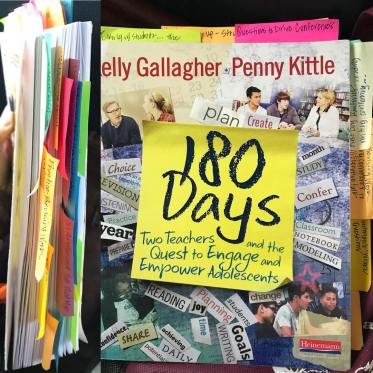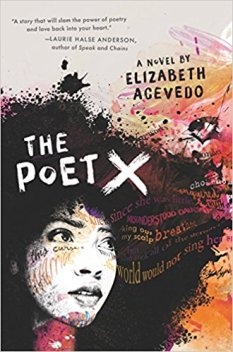April was a busy month for me. I was blessed with the opportunity to visit two schools, work with several fabulous educators, and learn alongside students in two different states. I am always amazed at the passion and courage students display when they are driven by an internal fire that motivates them to learn. But what I usually see is an educator who has provided a class structure that promotes time for independent reading, writing, and conversation. The teachers who invited me into their classrooms taught me a tremendous amount, and I am a better educator and thinker because I interacted with them.
Two books captured my heart during April. I hope you will find time and space to read them and share them with others. These books are splendid additions to your professional and personal collections. They will stretch your thinking, motivate your teaching life, invite you to question deeply held beliefs about people, education, instruction, and the things we hold sacred.
180 Days by Kelly Gallagher & Penny Kittle

When I first heard about 180 Days, the newest book from Penny Kittle and Kelly Gallagher, I pre-ordered it immediately. As you can see from the many sticky notes, it probed my thinking at a deep level, forcing me to think about my own classroom and the reading and writing practices I implement. The format of the book is beautiful and there are gorgeous images from both teachers’ classrooms to supplement the amazing methodology they discuss. Please keep in mind that this is a detailed professional book. It is beautifully written, but you will want to read with a pen and sticky notes. Philosophy is beautifully woven into the strategies offered, and each chapter sheds light on the best ways to engage our students in reading and writing. As English teachers, engaging students in reading and writing is the first hurdle in getting them to think like academics. We want our students to have robust reading and writing lives, but if we do not engage their hearts and minds, our attempts will be in vain. When we plan with students in mind, we never go wrong. Kittle and Gallagher describe the activities, assignments, quick writes, and notebook work that engaged their students. Standing beside their thinking will never cause harm!
The book is divided into two sections: Planning Decisions and Discourses. The Planning Decisions section provides a deep look at the why of teaching. At the beginning of the book, Kittle and Gallagher describe their planning process, stating that they begin with their beliefs. I loved this so much because it encapsulates everything I believe about planning. When I meet with co-workers to plan or to vertically align curriculum, I never hear a statement about the things we believe. Usually, these planning decisions begin with books we hold sacred and the ways to make our lives as easy as possible. They do not start with kids. Penny and Kelly challenge that thinking and describe the processes and conversations that enabled them to reach the students in their classrooms.
In the Discourses section, both educators delineate the essential questions they pose to students, and the narrative, informational, argumentative, and multi-genre writing projects that students complete. This part of the book includes detailed descriptions of their teaching process, and how they used mentor texts, small and large group conversations, writing conferences, and peer feedback to enhance the quality of student writing.
If you are a teacher who wants to change the reading and writing environment in your classroom, I encourage you to read this phenomenal book. I read it alongside a co-worker, and as we read, we met periodically to discuss our marginalia, thinking, and ideas for the next school year. There is a lot to digest in this book—deep thinking, complex ideas, lessons, strategies, and mentor texts—and reading alongside someone will only intensify the conversations about Kittle and Gallagher’s teaching.
The Poet X by Elizabeth Acevedo

This fabulous blend of poetry and prose slayed me with gorgeous lyricism and haunting sentences. Xiomara, a high school sophomore with a love of philosophy, is struggling to find her place among teenagers whose lives and intellect do not match her precocious understanding of the world. She thrusts her existential questions into writing, filling her notebook with keen insight. Her perceptive thinking catches the eye of her English teacher who invites Xiomara to an evening of spoken word poetry. Xiomara is elated; however, dogmatic ideologies, spawned by her mother’s deeply held religious beliefs, threaten to derail any chance of speaking power to the poems in her mind and notebook.
In addition to the issues at home, Xiomara is also caught into the beauty of a budding romance, one her mother will not approve of. This love interest encourages her work as a writer, and in ways, becomes a muse. I loved the feminist thread that ran through this novel—a young woman who unleashes her own power by writing herself to freedom and conquering the demons that try to dissuade her. She is a force to be reckoned with and in the end, she finds the fortitude to rise.
Please add these amazing titles to your to-read stack. I know that it is May, and as teachers, we find ourselves facing testing, more testing, deadlines, end-of-the-year minutiae, and bittersweet goodbyes with our students. Both of the books, however, will ignite your teaching and reading soul, refreshing your mind and heart as you look toward next school year. I encourage you to read it. And share your thinking.
#SparksInTheDark
P.S. Sparks in the Dark, my book with co-author Todd Nesloney (@TechNinjaTodd), will be available during the first week of June. I hope you will get a copy and learn alongside us as we work to affect the readers and writers in all of us!
2 comments